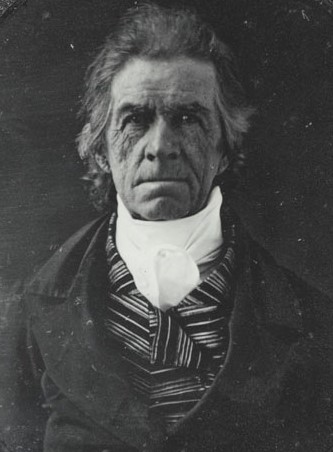Search
Search>> Events>> War of 1812>> United States>> John Hartwell Cocke IIJohn Hartwell Cocke II

Born September 19, 1780 - Died June 24, 1866
John Hartwell Cocke II was an American businessman.
Cocke was born on September 19th, 1780 at Mount Pleasant plantation in Surrey County, Virginia. By the age of twelve, Cocke was orphaned. At the age of fourteen he enrolled in The College of William and Mary in Williamsburg, Virginia. He graduated as part of the class of 1798. At the age of 21 he inherited his parents plantation, Mount Pleasant officially.
During the War of 1812, Cocke was commissioned as a brigadier general in command of the Virginia militia. From 1812 to 1813, Cocke led his forces in defense of Richmond, Virginia. He was a distinguished officer and was noted for strict discipline of his subordinates. His methods were compared to Baron Von Steuben a Prussian soldier who came to America and fought in the American Revolution. Von Steuben Regulations for the Order and Discipline of the Troops of the United States, which was the standard drill manual in the United States until the American Civil War.
In 1819, Cocke had completed a new plantation in Upper Bremo, using the architect who helped his longtime friend and associate, Thomas Jefferson build Monticello. Later the same year he was appointed to the Board of Visitors of the University of Virginia.
Cocke was a devout Christian and participated in several efforts to reform different aspects of society, including temperance and gradual emancipation. With Mount Pleasant he inherited several slaves, Cocke himself was opposed to slavery and felt abolishment of slavery was going to happen. He believed education and skill training was the way to accomplish emancipation. On his plantation in Virginia he worked to help educate slaves and help them to go to the newly created colony in Liberia. Once there, Cocke continued help with books and supplies. Cocke was not well liked by many of his pro-slavery neighbors and at one point was physically assaulted by one of them.
Cocke, being close with Jefferson, also put him in the midst of two major issues. Just before Jefferson's passing, he asked Cocke to be the executor on a will he was overseeing. The will was from a Polish nobleman who in his initial will wanted his American estate sold and the money used to free slaves, including Jefferson's slaves. Jefferson knowing Cocke was of a like mind, he asked him to handle the estate. Cocke refused because the will Jefferson held was one of three the nobleman had written. The estate was tied up for many years before the United States Supreme Court ruled the will Jefferson possessed was not valid. There are those who argue Jefferson tried to push off the will because he didn't want to free his slaves. Others point to the fact Jefferson most certainly realized the will was a legal nightmare and wanted to contest it.
The other issue Cocke was part of was the Jefferson-Hemings Controversy. Cocke's journals have been sought after in recent years because in them he wrote openly about his friend and Sally Hemings' long term relationship with. It is believed they had four children. About the more general practice of slave owners having relationships of one form or another with slaves, Cocke wrote:
It is too well known they are not few, nor far between...Were they enumerated with the statistics of the State, they would be found by hundreds. Nor is it to be wondered at, when Mr. Jefferson's notorious example is to be considered." A few years later, he returned to the topic: "All Batchelors or a large majority at least, keep as a substitute for a wife some individual of the[ir] own Slaves. In Virginia this damnable practice prevails as much as any where, and probably more, as Mr. Jefferson's example can be pleaded for its defense.
Cocke passed away on June 24th, 1866.
Cocke was a member of Jefferson Lodge No. 65 Surrey, Virginia. He at some point affiliated with Philanthropic Lodge No. 127, we know this because records indicate he was suspended from the fraternity for "unmasonic conduct." What the conduct was is unknown. His suspension took place around the passing of Thomas Jefferson and Jefferson's request for Cocke to become the executor of the will. This may be coincidental. All accounts have Cocke as an upstanding citizen.
This article provided by Brother Eric C. Steele.